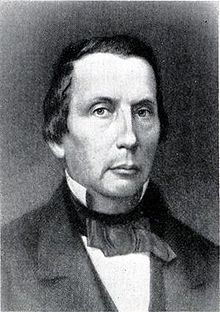David Swain
| David Lowry Swain | |
|---|---|
 |
|
| 26th Governor of North Carolina | |
|
In office December 6, 1832 – December 10, 1835 |
|
| Preceded by | Montfort Stokes |
| Succeeded by | Richard Dobbs Spaight, Jr. |
| Member of the North Carolina General Assembly | |
|
In office 1824–1830 |
|
| Personal details | |
| Born |
January 4, 1801 Buncombe County, North Carolina |
| Died | August 27, 1868 (aged 67) Chapel Hill, North Carolina |
| Nationality | American |
| Political party | Whig |
David Lowry Swain (January 4, 1801 – August 27, 1868) was the 26th Governor of the U.S. state of North Carolina from 1832 to 1835.
He was born in Buncombe County, North Carolina; his father, George Swain, was a farmer and a member of the North Carolina General Assembly. He received his early education at New Academy near Asheville and briefly attended the University of North Carolina, where he was a member of the Dialectic Society. Swain left his university studies in 1821 after only 4 months to study law with Chief Justice John Louis Taylor of the North Carolina Supreme Court; he was admitted to the bar in 1823.
The citizens of Buncombe County chose Swain as their representative in the North Carolina General Assembly from 1824 to 1830; he was appointed to the state Superior Court as a judge, serving from 1830 to 1832.
Swain resigned as a judge to accept the vote of the North Carolina General Assembly to serve as governor; at the time he was the youngest governor in state history, and the first to belong to the Whig Party. As governor, Swain was a promoter of internal improvements, including railroads and education, although he received little support form the legislature. In 1835, he was a leading delegate to the state constitutional convention; his last act as governor was to issue the proclamation declaring the ratification of 1835's extensive amendments to the North Carolina Constitution.
...
Wikipedia
